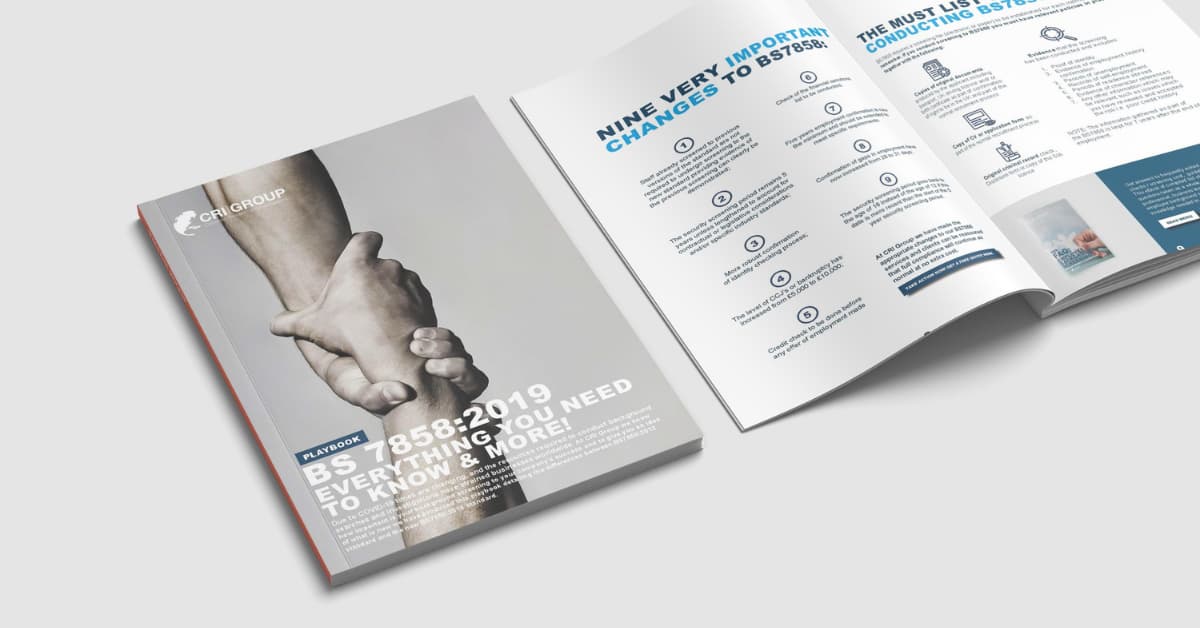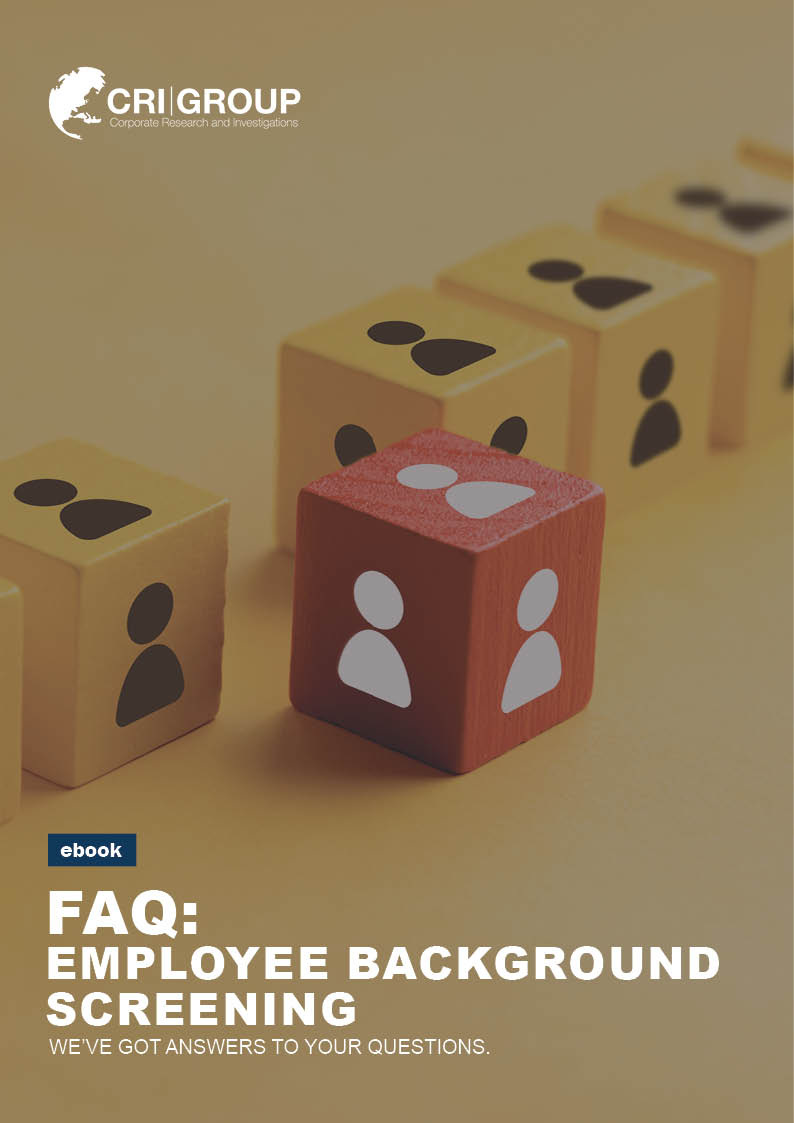The recent update of the BS7858 standard, “Screening of Individuals Working in a Secure Environment – Code of Practice,” places emphasis on the risk assessment of secure environment workers. The code focuses on the need for tighter controls over the pre-employment screening – and periodic re-screening – of individuals, who in their positions could potentially benefit from illicit personal gain, become compromised, or take advantage of other opportunities for creating breaches of confidentiality, trust or safety.
What is BS7858?
BS7858 stands for “Screening of Individuals Working in a Secure Environment – Code of Practice,” The BS7858 is a code of practice released by BSI (British Standards Institution), a business standards company which supports companies in achieving excellence within their field, and continuously boosting performance. Introduced in 2013, the standard was updated in September 2019 and is now considered to be the industry standard for all screening in employment, despite its original intention for use in security environments only. This code was meant to provide a critical security standard that guided employers on the screening process for security staff before offering full employment. However, the new update has widened the scope of this code.
This British Standard helps employers to screen personnel before they employ them. It gives best-practice recommendations, sets the standard for the screening of staff in an environment where the safety of people, goods or property is essential. This includes data security, sensitive and service contracts and confidential records. It can also be applied to situations where security screening is in the public’s interest. It sets out all the requirements to conduct a screening process. It covers ancillary staff, acquisitions and transfers, and the security conditions of contractors and subcontractors. It also looks at information relating to the Rehabilitation of Offenders and Data Protection Acts. CRI Group is the first and only investigative research company in the Middle East to receive the certifications BS7858:2019 and BS102000:2013, Code of Practice for the Provision of Investigative Services from internationally recognised training and certification body BSI.
Change of scope
The change of scope is possibly the biggest change of the standard. In the old document, the standard concerned the security sector only. However, the scope has been amended to allow organisations in all environments to adopt the standard when employee screening. And due to the current pandemic, this update is more significant than ever. There is a specific section of the standard that relates to risk management which states: “An integral part of risk management is to provide a structured process for organisations to identify how objectives might be affected. It is used to analyse the risk in terms of consequences and their probabilities before the organisation decides what further action is required”.
BS 7858:2019 lays out the scope of “obtaining personal background information to enable organisations to make an informed decision, based on risk, on employing an individual in a secure environment.” Those workers include business owners, directors, partners, silent partners and shareholders holding more than 10% of the business; managers, area managers, department managers, screening managers and staff; installers and service crew; security personnel; and office supervisors and staff with access to customer and system records.
The amended guidelines of the standard put the onus on the organisation’s top management to demonstrate that they are focused on the aspects of the business where the most risk lies, and the particular personnel roles that are involved within those risks areas. This is particularly important because, as the standard states, the “organisation retains ultimate responsibility for an outsourced screening process and is required to review the completed screening file.” Risks assessment includes examining specific roles that involve financial tasks, data security, management of goods, property risks or any number of “people risks” such as roles with direct access to vulnerable adults and children.
To that end, management is charged with ensuring that the organisation has proper and adequate resources and infrastructure in place to manage the adequate vetting of high-risk personnel. Management is tasked with the response and that there is a firm commitment at the top level to manage and support the coordination required to execute the screening process. Finally, management is tasked with ensuring that such responsibilities are correctly assigned and communicated throughout the organisation. The guideline also eliminates from its original text in 2012, a requirement to produce character references as part of the screening process. This decision was based on the supposition that such references are now deemed as potentially weak and difficult to verify. Managing risk effectively is essential to ensure businesses succeed and thrive in an environment of constant uncertainty. ISO 31000 aims to simplify risk management into a set of clearly understandable and actionable guidelines, that should be straightforward to implement, regardless of the size, nature, or location of a business.
BS7858:2019, a new way to mitigate employee risk during COVID-19
The far-reaching impact of the COVID-19 outbreak has affected virtually every business and economic sector worldwide, and depending on the global region, has hampered (on various levels) the ability to conduct proper and thorough background screening investigations. In the United Kingdom and the United Arab Emirates, the countrywide lockdowns forced leaders to close sites and send their workforce home. Many are having to learn how to manged people working from home (WFH) or remotely for the first time. The previous concerns about productivity, privacy and protecting sensitive information only grew more with the practice of WFH. They highlighted the vital importance of pre-employment background screening and background investigations. BS 7858:2019: the revised Standard for screening individuals working in secure environments offers a complete solution.
The revised BS7858 standard enables organisations to demonstrate a commitment to safeguarding their businesses, employees, customers and information utilising widely accepted methods that focus on risk assessment and top-down management involvement in the company’s employment policies and practices. In establishing policies and procedures around the standard, organisations can show that they place a high value on hiring individuals who possess integrity. Organisations can then task them with responsibilities designed to keep their co-workers, customers and information safe from the opposing forces that have become more prevalent in today’s ever-changing COVID-19 world. Find out more on how you can mitigate employee risk during this pandemic with BS7858:2019.
Playbook BS7858:2019, everything you need to know and more!
| The price of a bad hire has far-reaching consequences for any business, including productivity loss, decreased employee morale, risks to employee safety and increased exposure to costly negligent hiring claims and potentially devastating litigation. The premise behind the standard is to safeguard employers from harmful or fraudulent hires.
Cases of organisations that forego conducting due diligence on a new hire – especially a hire with high-risk exposure – often end badly for those organisations. At CRI Group we know how important is your background screening to your company’s success and to give you an idea of what is new we have produced this playbook detailing the differences between BS7858:2012 standard and the new BS7858:2019 standard. |

|
Managing your people through COVID-19
The COVID-19 pandemic is undeniable affecting the world. And the situation is changing at an hourly rate as we go into a second global lockdown. Businesses are having to adapt quickly to survive, i.e. cutting steps in their hiring process, and no-one knows how this will play out. However, there are ways you can mitigate the impact, learn how with this FREE ebook.
Taken as a whole, this ebook is the perfect primer for any HR professional, business leader and companies looking to avoid employee background screening risks. It provides the tools and knowledge needed to stay ahead of COVID-19 effectively. Read the answers to the following questions:
|

|
Frequently asked questions about background checks
Get answers to frequently asked questions about background checks / screening cost, guidelines, check references etc.
This eBook is a compilation of all of the background screening related questions you ever needed answers to:
|
 Taken as a whole, is the perfect primer for any HR professional, business leader and companies looking to avoid employee background screening risks. It provides the tools and knowledge needed to make the right decisions. |
Let’s Talk!
BS7984:2008 accredited companies (such CRI Group) highlight to their clients that their security personnel are staff that can be trusted and relied upon to complete a high-quality job as the screening process highlights the level of conduct that they have presented in the past. This reassures the safety of the people, goods and property that they have been hired to protect. If you have any further questions or interest in implementing compliance solutions, please contact us.
About the Author
Zafar I. Anjum, is Group Chief Executive Officer of Corporate Research and Investigations Limited “CRI Group” (www.crigroup.com), a global supplier of investigative, forensic accounting, integrity due diligence and employee background screening services for some of the world’s leading business organizations. Headquartered in London (with a significant presence throughout the region) and licensed by the Dubai International Financial Centre-DIFC, the Qatar Financial Center-QFC, and the Abu Dhabi Global Market-ADGM, CRI Group safeguards businesses by establishing the legal compliance, financial viability, and integrity levels of outside partners, suppliers and customers seeking to affiliate with your business. CRI Group maintains offices in UAE, Pakistan, Qatar, Singapore, Malaysia, Brazil, China, USA, and the United Kingdom.
Zafar Anjum, MSc, MS, LLM, CFE, CII, MABI, MICA, Int. Dip. (Fin. Crime), Int. Dip. (GRC)
CRI Group Chief Executive Officer
37th Floor, 1 Canada Square, Canary Wharf, London, E14 5AA, United Kingdom
t: +44 207 8681415 | m: +44 7588 454959 | e: zanjum@crigroup.com
Who is CRI Group?
Based in London, CRI Group works with companies across the Americas, Europe, Africa, Middle East and Asia-Pacific as a one-stop international Risk Management, Employee Background Screening, Business Intelligence, Due Diligence, Compliance Solutions and other professional Investigative Research solutions provider. We have the largest proprietary network of background-screening analysts and investigators across the Middle East and Asia. Our global presence ensures that no matter how international your operations are we have the network needed to provide you with all you need, wherever you happen to be. CRI Group also holds BS 102000:2013 and BS 7858:2012 Certifications, is an HRO certified provider and partner with Oracle.
In 2016, CRI Group launched Anti-Bribery Anti-Corruption (ABAC®) Center of Excellence – an independent certification body established for ISO 37001:2016 Anti-Bribery Management Systems, ISO 37301 Compliance Management Systems and ISO 31000:2018 Risk Management, providing training and certification. ABAC® operates through its global network of certified ethics and compliance professionals, qualified auditors and other certified professionals. As a result, CRI Group’s global team of certified fraud examiners work as a discreet white-labelled supplier to some of the world’s largest organisations. Contact ABAC® for more on ISO Certification and training.



